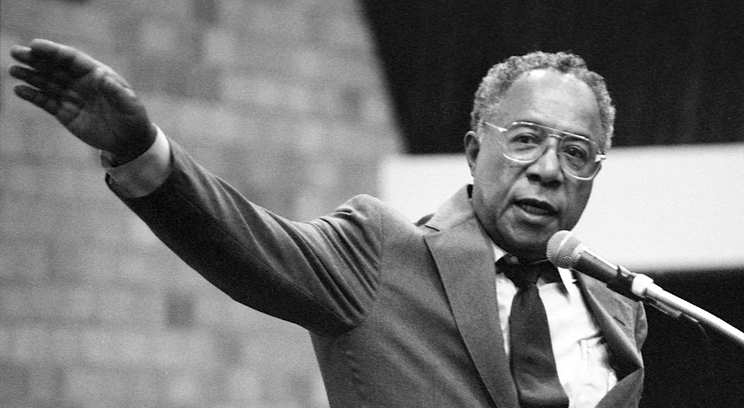Deep roots
Author Alex Haley probably did more to encourage the study of genealogy on a personal level than anyone before him – or since. His acclaimed novel Roots: The Saga of an American Family (1976) and a popular television miniseries it spawned seemed to awaken in the nation an interest in learning about one’s past.
Haley spoke here on Oct. 28, 1986, in the O'Shaughnessy Educational Center auditorium. The All College Council, forerunner of today’s Undergraduate Student Government, sponsored the lecture. Haley titled his talk "The Family: Find the Good … and Praise It.”
"People today must continue to work toward a better future for their descendants, much as their own ancestors did, said Roots author Alex Haley," according to Gael Fashingbauer reporting for The Aquin, the student newspaper at that time.
Fashingbauer continued:
Haley first became interested in writing in the Coast Guard, which he joined at his father's urging after two years of college. "Being a student could not even compare to being a sailor," Haley said. He began to send home letter after letter explaining his marvelous new life. Haley's image as a prolific letter writer created a thriving shipboard business in which he would write love letters for his fellow sailors to copy over and send to their girlfriends. The sailors were so pleased they voluntarily paid Haley $1 for each letter, and he soon was making more writing than as a Coast Guard cook.
"That literally is what gave me my first thought that there might be something for me in the writing business," Haley said. After 20 years in the Coast Guard, Haley began a career as a freelance magazine writer.
Haley won a Pulitzer Prize Special Citation for Roots in 1977, but he was sued for plagiarism a year later by Harold Courlander, author of the novel The African. The suit received little publicity. After a five-week trial Haley settled out of court and released this statement: "Alex Haley acknowledges and regrets that various materials from The African by Harold Courlander found their way into his book Roots."
Nevertheless, Roots moved a nation to look to its past in order to work for a better future for those who will follow in our personal genealogical footsteps.
Discovering your genealogy is not only fun, educational and a family-bonding opportunity, it also may reveal an interesting heritage. My father was a history buff and he helped me trace our family tree for a fifth-grade project.
On my mother's side of the family, we discovered that my great-great grandfather, 1st Lt. Elias M. Holmes, 48th Illinois, was killed at the battle of Shiloh on April 7, 1862. I have visited his grave at Shiloh National Cemetery.
On my father's side of the family, we traced the genealogical footsteps of the Couillard clan to Lt. John Couillard, who was born about 1655 in France. Those footsteps can now be followed via the Family of Adam Couillard on the Town of Monroe, Maine, website. And then there is my grandmother, a family favorite – Jane Flynn, born in County Sligo, Ireland.
The website states:
Early in life he entered into the Marine Service and subsequently enlisted on board a French frigate which, in one of the wars of the 17th century between France and England, had an engagement with an English frigate along the coast of America during which the two ships were brought into immediate contact by grapplings for the purpose of boarding. The station of young Couillard was that of Captain of the Main Top, and while the two frigates were thus boarded together, he passed from the French ship to the English vessel. The frigates soon separated without capture on either side leaving Couillard prisoner on board the English frigate, which soon put into Boston Harbor, where Couillard was discharged.
No longer a prisoner of war, he settled and married in Maine. Generations later, a branch of the clan moved to the Midwest and Minnesota. (Why couldn’t they have settled in someplace warm?)
Descendent No. 29 on the website, Cornelius Couillard, is my great-great-great grandfather, one of the early settlers of Richfield. Many in the family still live there. Cornelius farmed 160 acres in Richfield, and the home he built in the mid-1800s still stands at 7021 First Ave.
Now those are some deep roots!
The Depth of Field Icons series will bring you historical images of noteworthy cultural, political or artistic personalities who have visited campus.







